Sometimes I want to read like an explorer, learning something new and venturing onto every page not knowing if it might be the page where things go wrong. But there are many times when I read for comfort, and then I turn to books I know well. Books I know really well. Books I’ve read over and over and over again because they always make me feel better.
For me, this kind of comfort reading goes beyond escapism. There are lots of books that can give me a temporary escape from reality, but comfort reads give me sustenance. They remind me about the flow of friendship and the reassurance of people who understand. Not only do the characters feel like friends, but specific scenes that I like feel like friends. The jokes that I know are coming are still funny. These books refresh me and leave me smiling at the end.
Even though these books feel like a safe space, they’re not necessarily “cozy” in the genre sense. My comfort reads have a surprisingly high body count, and often deal with serious issues. But the characters, the settings, the wit and whimsy of the prose, and the powerful assertions of resilience, community, competence, and justice leave me feeling strengthened rather than shaken.
As I was coming up with and writing my new novella, The Mimicking of Known Successes, I wanted it to be a comfort read of this kind. Here are five books that inspired—and comforted—me along the way.
Think of England by KJ Charles
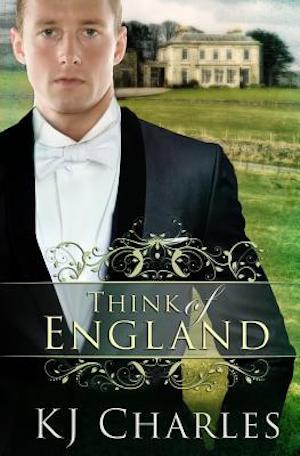
Almost every book in Charles’s considerable oeuvre feels like slipping into a perfectly warm bath: the assured writing, the rich characters and historical detail, the moments of hilarity, the ensembles of friends and family who support each other through differences and difficulties. Oh, and the excellent comeuppances for richly deserving evil-doers.
Think of England is a particular favorite of mine (and a good entry point, since it’s more or less standalone). It combines suspense, romance, and sharp social commentary into a superbly paced plot with nods to pulp classics and country-house mysteries. Reeling from emotional and physical trauma, Archie Curtis determines to take advantage of a party in a remote mansion for some espionage that he knows he’s not suited for. Meeting Daniel Da Silva, a dandified poet entirely foreign to Archie’s experience, only confounds him further, even as the hints of conspiracy gets more and more sinister.
While I love the perfectly timed unfolding of the suspense, what really makes this book a comfort to me is the delicious portrayal of a character slowly reassessing his first impressions and discovering easy communion in the place he least expected. The addition of several unexpected new friends and a fine balancing of cleverness and violence—which solves at least one problem nicely—make this a brilliant read, with some equally comforting companion books in the same world if you’re looking for more.
The Best of All Possible Worlds by Karen Lord
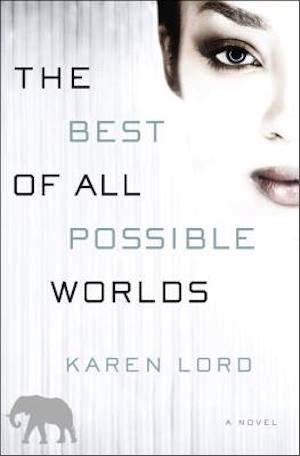
This book begins with an apocalyptic disaster and is built around the experiences of galactic refugees trying to integrate—or not—in a new society, but while it doesn’t shy away from the trauma and hardship, it is also a fun, comforting, hopeful read. In part this is because it is set on a planet eager to welcome refugees, and government-employed biotechnician Grace Delarua, is eager to support the process. It’s also because of Delarua’s voice: direct, colloquial, relatable, curious, and warm, Delarua is the perfect narrator to lead us on a picaresque journey through the many cultures of Cygnus Beta, commenting and experiencing adventures as she does.
The novel draws from anthropology and folklore, delves into the ethics of telepathy and the metaphysics of time-travel, and sets the stage for intergalactic intrigue that continues through the sequels. There is action, comedy, and a slow-burn, vastly appealing romance between Grace and her magnetic counterpart, Dllenahkh, along with the growing camaraderie among a whole team of government and academics entirely dedicated to supporting the grieving remnants of a powerful civilization. It’s a beautiful story, but I think the main reason I return to it again and again is to spend more time with Delarua.
The Beekeeper’s Apprentice by Laurie R. King
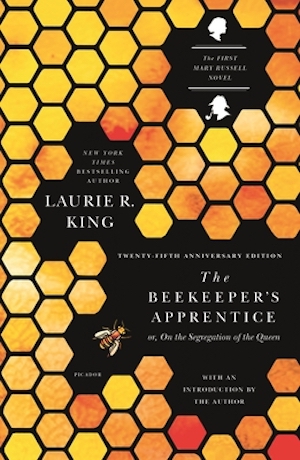
Sometimes the way we feel about a book is tied to when we first read it. Rereading The Beekeeper’s Apprentice always reminds me of college and long book discussions with roommates, but even without those associations I think I would still find it a comfort read.
Mary Russell is a bereft teenager, alone and traumatized; her neighbor is a cranky, erudite, middle-aged man who happens to be the world’s greatest detective. Through training, early cases, and a cataclysmic confrontation with a vicious enemy, the book follows Russell and Holmes as they evolve into a relationship of equal partners. Along the way we get the classic Holmes paraphernalia—disguises, minute clues, smelly chemical experiments, explosions, unlikely escapes—as well as nineteen-teens London and Oxford.
It’s a fun ride (and definitely one of the inspirations for my approach to Holmesian elements in The Mimicking of Known Successes), and I think what makes such a comforting reread for me is the sense of Mary growing into her own strength and confidence—with a demanding but stalwart partner there to support her. There’s a scene in which Mary, returning home tired and late, has to decide on the basis of the smallest of hints whether to climb the wall of her building in a snowstorm. It’s a great example of how reading about uncomfortable adventures can make us feel cozier even as we enjoy the thrills—and it doesn’t hurt that afterwards there’s reliably a blazing fire, tea or maybe whiskey, and deductive reasoning as a digestif.
Swordheart by T. Kingfisher
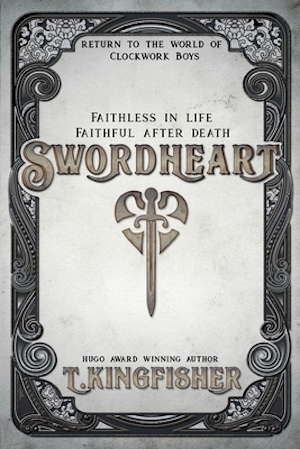
This book is like a perfectly aligned D&D campaign, with exactly the right balance of adventure, travel, snarky companions, surprising creatures, and satisfying victories, with a lovely romance to make it even more fun.
Halla has just inherited a lot of money, making her the target of her unscrupulous in-laws. Fortunately, she learns that she’s also inherited a magic sword, which releases an enchanted man, Sarkis, to protect her. The task doesn’t seem too difficult at first—Halla’s in-laws are not up to the standard of the armies Sarkis has fought before, but as they search for a way to save Halla’s modest inheritance, they end up facing multiple complications, not the least of which is the cultural gulf between them.
Halla and Sarkis—and Zale and Brindle—have top-notch banter skills and a refreshingly practical approach to adventuring. There are plenty of bad people in this book, but there are also a lot of examples of care, community, and thoughtfulness from even brief side characters, not to mention an entire religion based around helping people as efficiently as possible. The entire book is a delight.
All Systems Red (really the whole Murderbot series) by Martha Wells
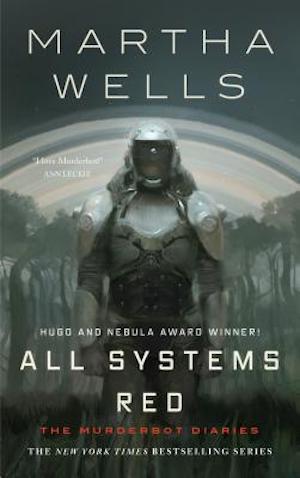
This last example probably seems like the unlikeliest to be comforting. It’s about a terrifying killing machine and also about not wanting to talk to anyone, ever and… honestly both of those are great? The killing machine part because of a strong sense of retributive justice and also competence porn, and the not wanting to talk to anyone because it’s just so relatable. The Murderbot series deals with capitalist exploitation and surveillance and the question of who gets to be a person, but underlying it all we have the safety net of knowing that Murderbot is very good at its job and that while we’re reading we don’t have to talk to anyone.
Murderbot is a security cyborg who managed to hack its way out of corporate control but is content to keep doing its job while watching lots and lots of media on the side until the researchers it’s protecting are threatened by uncalled-for attacks. Getting them out of the crisis means going beyond its job and, terrifyingly, figuring out that it might want something more than lots of shows to watch. I find Murderbot’s voice instantly comforting in its clarity, humor, and above all, familiarity.
Please share your favorite comfort reads in the comments. I’m always looking for more!
Buy the Book
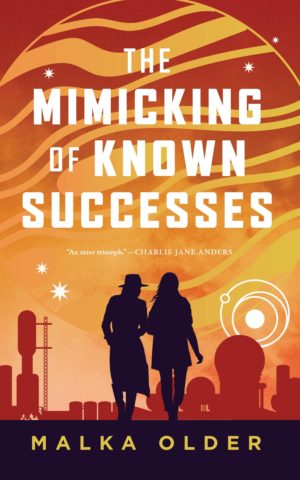

The Mimicking of Known Successes
Malka Older is a writer, aid worker, and sociologist. Her science-fiction political thriller Infomocracy was named one of the best books of 2016 by Kirkus, Book Riot, and the Washington Post. The Centenal Cycle trilogy, which also includes Null States (2017) and State Tectonics (2018), is a finalist for the Hugo Best Series Award of 2018.










